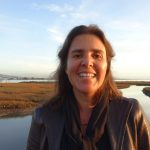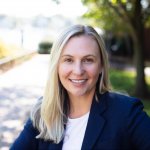Amanda Monaco
Fresno, California
Amanda works as a policy coordinator for water programs and helps communities organize and fight for their right to equitable access to drinking water and wastewater services and sustainable groundwater management. She is from Gainesville, Florida, and attended the University of Florida, where she got her B.A. in Political Science and also studied Latin American Studies, Sustainability Studies, and Anthropology. She received her J.D. from Georgetown University Law Center in Washington, D.C., where she studied human rights, environmental, corporate and trade law. Before working with Leadership Counsel, she was an ally for communities fighting environmental injustices in Latin America with several nonprofits based in D.C. and Mexico City.
Through community organizing, research, legal representation, and policy advocacy, the Leadership Counsel for Justice and Accountability impacts land use and transportation planning, shifts public investment priorities, guides environmental policy, and promotes the provision of basic infrastructure and services. Based in the San Joaquin and Eastern Coachella Valleys, they work alongside the most impacted communities to advocate for sound policy and eradicate injustice to secure equal access to opportunity regardless of wealth, race, income, and place.
This interview was conducted by Carly Schmidt on June 23, 2020. Learn more about Amanda’s work at the Leadership Counsel.
How did you become involved in the Leadership Counsel and what is your role in the organization?
Before coming to the Leadership Counsel, I was working in international human rights and environmental law. I wanted to come back to the U.S. and contribute to movements toward racial and environmental justice. When I initially came back to Fresno from Mexico City, I started working as a policy advocate on water and transportation issues. I was mostly working with residents to hold local governments accountable to their needs, knowing that communities of color continue to be under-served and the most vulnerable to environmental harms. Here, I became really focused on water, which wasn’t something I’d thought about before. Working in Mexico City was the first time I heard about water scarcity issues. Now, in California, we work with communities on the front line of climate change and groundwater contamination issues. Through all that, I realized that water is a controversial and deeply political issue in California because it is not only scarce, but the foundation for agriculture in the state, so you get a lot of economic interests coming to the table in conversations around water allocation. Our work is tangentially involved in the Sustainable Groundwater Management Act, which is calling agencies to re-think how they manage groundwater resources. As this is being implemented, we are currently working on bringing the communities we work with to the table because they have the most to gain and the most to lose from these groundwater management plans.
You began your career as a legal fellow at the Inter-American Association for Environmental Defense in Mexico City. How did that experience inform your current work in California?
Since college I’ve wanted to work in community-based environmental advocacy. Working at this organization in Mexico City allowed me to do just that and I was able to work directly with communities. This experience made me realize that there was great community work being done all over the world. I was able to work with groups in Peru and southern Mexico on issues related to fighting dams and wetland destruction, and it was so cool to see these communities realize that they have a stake in the environment and decide do get involved. When this fellowship was over, I realized that I wanted to do the same work in my own country. Communities all over the world are fighting the same issues, like big business looking for profit or governments prioritizing economic growth at the expense of the environment. Coming back was definitely the right decision because I could address these same issues in my home country.
I initially left the U.S. because I was fascinated with other ways of thinking. I think my initial interest in international human rights was driven by curiosity about other life experiences. Now, my focus has turned to where I live and applying what I have learned from different places and experiences. Growing up, I thought we were fine in the U.S. because I had so much privilege. I am tremendously grateful that I can do something to address inequality in my own country.
I was sifting through the Leadership Counsel website and it looks like you guys do everything, by that I mean addressing what seems to be every source of inequity in the communities you serve. What projects are taking up the most of your time and attention these days?
My role at the Leadership Counsel is atypical because I focus on one subject area: groundwater management. This huge Sustainable Groundwater Management Act affects how groundwater is being managed here. My primary focus, right now, is monitoring 17 agencies doing this work and developing management projects. The Act mandates that agencies create new groundwater management plans that survey the current situation and address how they will reach sustainability goals in 20 years.
The Leadership Counsel is community based. We have long-standing relationships based on trust with communities. These folks contact us and we work with them to address issues that are within our wheelhouse. With the SGMA, we are bringing the feedback process to them. We ask if they want to be involved and help them get involved. Most communities want a seat at the table because they remember the drought in 2014 where thousands of wells went dry. These people know what the results of poor water management look like and want to take an active role in preventing it.
What is the nature of the Leadership Council’s involvement with River Network and how has this partnership been helpful to you in working toward your mission?
Alongside the Central California Environmental Justice Network, we have been actively participating in the drinking water cohort. We have been really inspired by these peer calls and in-person meetings with the cohort because it is really hard to keep hammering away at public officials. We are trying to tell them that drinking water matters, and sometimes it feels like you are getting nowhere and it is hard to keep going. Being in a room with people with different perspectives and employing different strategies has really helped to renew our motivation in this work.
What changes would you like to see the Leadership Counsel make in the communities you work in over the next 10 years?
In 10 years, I hope that the communities we work with all have access to clean, safe drinking water and that they do not need to worry about scarcity or their wells going dry. I also hope that state and local agencies see the importance of water decisions and are equipped with institutional knowledge and determination to engage communities in these decisions.







